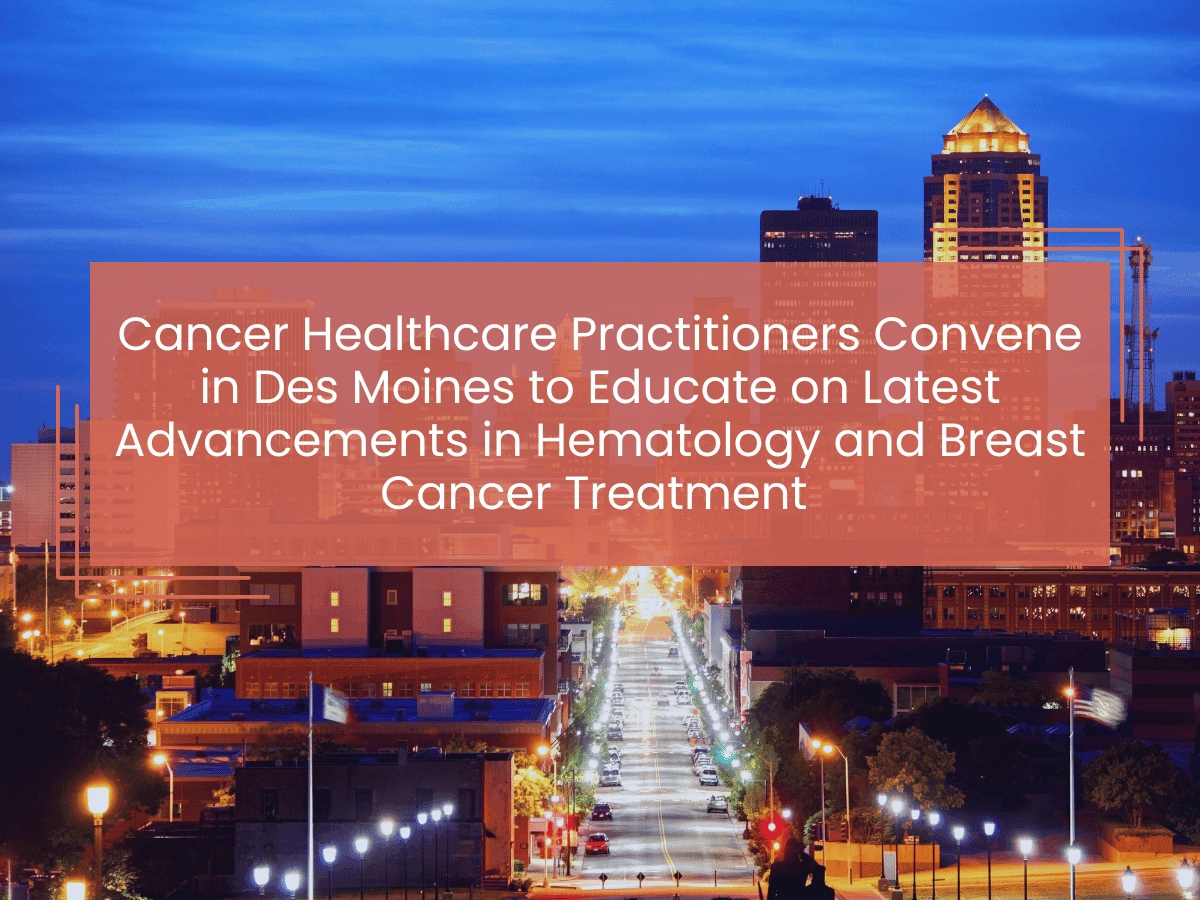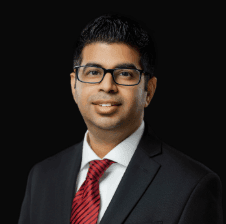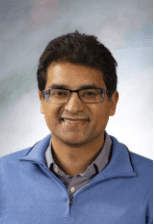Cancer Healthcare Practitioners Convene in Des Moines to Educate on Latest Advancements in Hematology and Breast Cancer Treatment

Author
Binaytara Team
Introduction
On March 29, 2025, Dr. Kartik Anand, a hematologist/oncologist at The Iowa Clinic, and Dr. Vishal Vashistha, Chief of Staff for the VA Iowa City Healthcare System and Adjunct Associate Professor of Medicine at the University of Iowa Carver College of Medicine, will co-chair the Best of Hematology and Breast Cancer 2025 in Des Moines, Iowa. In this interview, the co-chairs discussed the goal of the conference, one of which is to provide critical updates from the San Antonio Breast Cancer Symposium (SABCS) and the American Society of Hematology (ASH) meeting, focusing on both benign and malignant hematology. Among the key topics, the conference will feature an in-depth session on metaplastic breast cancer, designed to engage busy community providers and enhance research directions through shared expertise. Register for the conference here.
Highlights of Interview
Latest Research & Clinical Updates
The conference will present essential findings from the SABCS and ASH meetings, ensuring that healthcare practitioners stay informed on evolving hematology and breast cancer treatments.
Enhancing Provider Engagement
Sessions will use real-world case discussions to provide practical insights for community oncologists, with talks covering leukemia, lymphoid malignancies, breast cancer management, and tumor board-style case-based discussion on metaplastic breast cancer.
Addressing Cancer Disparities
The conference co-chairs emphasized the need to improve clinical trial access and reduce disparities, particularly through community-based initiatives and global efforts such as the Binaytara’s hospital project.
Interview
We met with Dr. Anand and Dr. Vashistha to discuss the impact of the upcoming conference in Iowa, their goals as chairs, and cancer disparities in the region.
Question | Binaytara: Why did you choose to chair the Best of Hematology and Breast Cancer Conference?
Answer | Dr. Anand: “I attended a Binaytara conference in Minneapolis, where I met Dr. Shah and really enjoyed the experience. It featured many new updates. In 2024, we held a similar conference in Des Moines, Iowa, which received great community feedback. Based on that success, we decided to bring it back in 2025 to provide community providers with key updates from the SABCS and ASH Conference held in December 2024.”
Answer | Dr. Vashistha: “I have a strong relationship with Binaytara and have helped organize three conferences. While at the New Mexico VA Medical Center, I was also affiliated with the University of New Mexico, where I contributed to a conference in Albuquerque. Since then, I have helped with the prior Des Moines Cancer Conference, the Iowa Hematology Oncology Conference last year. This year’s Hematology and Breast Cancer Conference in Des Moines is another great opportunity to hear from specialists. As a generalist, I value learning from experts with deep knowledge in their fields. The conference also fosters networking and collaboration among hematologists and oncologists in the region.
Beyond education, I find it meaningful to contribute to improving cancer care, both regionally and internationally. Supporting efforts like Dr. Shah and his wife’s work in developing cancer centers aligns with my values, and I am proud to be part of these initiatives.”
Q: What are some of the key themes and topics at this conference that excite you?
A | Dr. Anand: “The conference covers a broad range of topics, from benign to malignant hematology, with a focus on updates from the ASH meeting (December 2024) and the San Antonio Breast Cancer Symposium. Our goal is to present practice-changing insights relevant to community oncology providers. Large conferences can be overwhelming, so we aim to highlight the most impactful updates in breast cancer and hematology, the ones that truly influence clinical practice.
There are many updates in breast cancer across all subtypes: hormone receptor-positive, HER2-negative, HER2-positive, and triple-negative. We are excited to hear from experts and bring these advancements to the community, especially since Iowa has the second-highest cancer rate in the country, making access to the latest information crucial.”
A | Dr. Vashistha: “CAR-T therapy has become a standard of care in many hematologic malignancies. Additionally, bispecific antibodies are emerging as powerful treatments with unique side effect profiles, showing dramatic efficacy in responsive patients. We have excellent hematologists speaking on these advancements.
In breast cancer, surgical and radiation oncologists will discuss treatment de-escalation, including smaller incisions, narrower radiation fields, and reducing unnecessary treatments while minimizing recurrence risk. On the systemic therapy side, I am particularly interested in HER2-low and HER2-ultralow disease, which were not traditionally targeted with HER-2 directed therapies but are now increasingly targeted as part of standard care. These discussions will provide valuable learning opportunities.”
Q: What are some of the disparities you see in your practice?
A | Dr. Anand: “We can improve clinical trial enrollment in the community, and we are focusing on that here at Iowa Clinic. Our goal is to offer more innovative trials for patients so they do not have to travel to a big city, as many lack the resources or time. We want to provide care closer to home.”
A | Dr. Vashistha: “Overall, providing clinical trial options for patients residing in rural areas remains a challenge across private and public healthcare systems. Major cancer centers are usually located in large cities where patient volumes are higher. All healthcare systems need to find innovative ways to enroll these patients in clinical trials. I know many private cancer centers and University centers are working towards this goal, and national government programs are working hard to ensure opportunities for these patients as well.”
Q: How important are preventative strategies for improving cancer patient outcomes?
A | Dr. Anand: “For breast cancer, we recommend annual mammograms starting at age 40. Women with dense breasts may need additional MRI screening, as mammograms may not detect small tumors in dense tissue. I also encourage women with a family history of breast cancer to consider genetic testing, which may suggest earlier screening based on their risk factors. For leukemia, there is no screening test. We encourage people to report new symptoms and have annual physicals. If blood counts are abnormal, we can address it at that point.”
A | Dr. Vashistha: “My father always says it is better to prevent a problem than deal with one later. Preventive strategies encompass a wide range of factors, with lifestyle and weight being key issues. Exposures and screening strategies also play a role, but screenings can also bring anxiety and potentially unnecessary diagnostic tests and procedures. We must try our best to follow clinical data that clearly confirms the benefits of any screening strategy. While therapeutic interventions to reduce cancer risk are promising, especially among patients who are at high risk for developing breast cancer, many non-surveillance medicinal approaches are still in the evaluation phase. Unfortunately, cancer remains something we must continue to treat, while highlighting the importance of encouraging patients to follow primary care guidelines and recommendations to help with cancer prevention.”
Q: Do you have any final thoughts or message?
A | Dr. Anand: “Involving both community and academic participants makes the conference more productive. It helps bridge the gap between research and real-world challenges. Sometimes, the community may raise questions or perspectives that are not being considered in academic settings, and vice versa. This creates a dynamic learning experience where ideas flow in both directions.”
A | Dr. Vashistha: “I am excited about this conference because it is one of my favorites. I hope attendees take full advantage of the opportunity to learn and gain new insights that they can apply in their work. It is a great chance to grow professionally and personally.”
Register here to join us in Des Moines, Iowa, and be part of the conversation on revolutionizing patient care and expanding access to innovative therapies for underserved communities. To participate and follow conversations online, use the hashtag #BTFHemBreast25.

Dr. Kartik Anand
About Dr. Kartik Anand
Dr. Kartik Anand joined The Iowa Clinic as a Hematologist/Oncologist in 2025. He completed medical school in India, internal medicine residency at Louisiana State University Health Sciences Center in Shreveport, Louisiana, and hematology/oncology fellowship at Houston Methodist Hospital in Houston, Texas. He has been involved in clinical research, including clinical trials. His interests are in community hematology and oncology, with a special focus on breast cancer, lung cancer, and myeloma.
Dr. Anand has been awarded numerous academic awards, including the Merit Award twice by the American Society of Clinical Oncology, Outstanding Scholar and Clinician Award by Houston Methodist Hospital, and Excellence in Research Award by Houston Methodist.

Dr. Vishal Vashistha
About Dr. Vishal Vashistha
Dr. Vishal Vashistha serves as Chief of Staff for the VA Iowa City Healthcare System and Adjunct Associate Professor of Medicine at the University of Iowa Carver College of Medicine, bringing expertise in hematology, oncology, and internal medicine. Previously, he held positions at the New Mexico VA Medical Center, Durham VA, and Duke University, following training at Cleveland Clinic and Ohio State University.
An advocate for precision oncology, Dr. Vashistha's research focuses on expanding targeted therapies for Veterans through the VA’s National Precision Oncology Program. His work has earned him the ASCO Young Investigator Award and a Fulbright-Nehru Award for studying cancer care access in India. He also serves on the American Society of Hematology’s Standing Committee on Government Affairs.